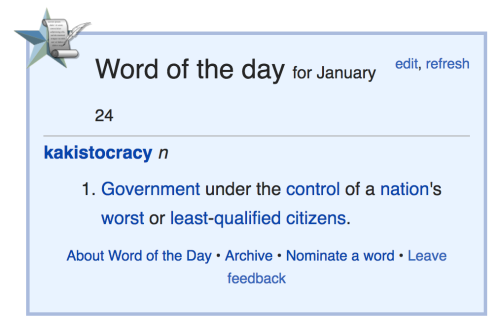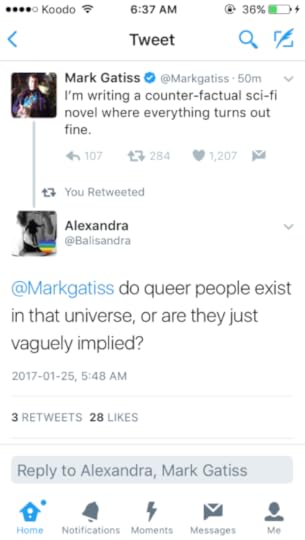XistentialAngst's Blog, page 5
January 30, 2017
Acting Attorney General Orders Justice Dept. Not to Defend Refugee Ban
Acting Attorney General Sally Q. Yates, a holdover from the Obama administration, ordered the Justice Department on Monday not to defend President Trump’s executive order on immigration in court.
“I am responsible for ensuring that the positions we take in court remain consistent with this institution’s solemn obligation to always seek justice and stand for what is right,” Ms. Yates wrote in a letter to Justice Department lawyers. “At present, I am not convinced that the defense of the executive order is consistent with these responsibilities nor am I convinced that the executive order is lawful.”
The decision is largely symbolic — Mr. Trump’s nominee to be attorney general, Jeff Sessions, is likely to be confirmed soon — but it highlights the deep divide at the Justice Department and elsewhere in the government over Mr. Trump’s order.
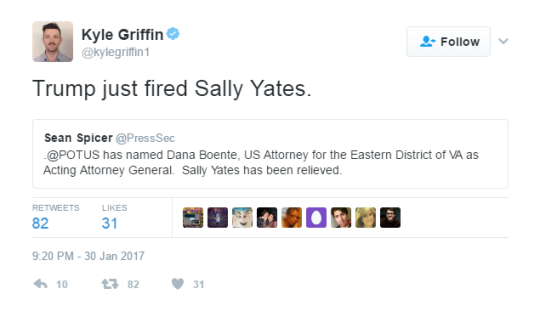
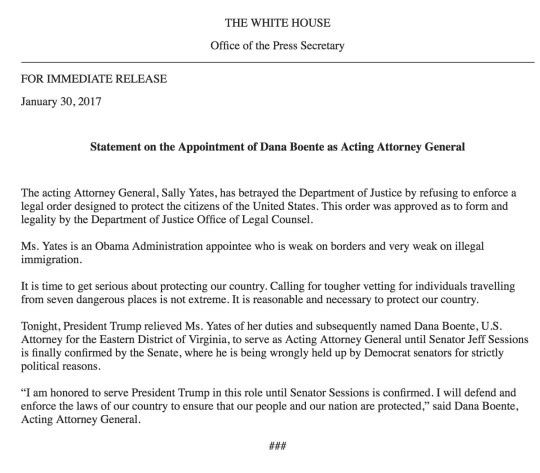
“Sally Yates has betrayed the Department of Justice”
January 26, 2017
love-in-mind-palace:
sherlocking-out-loud:
imtooticky:
glenmoresparks:
marsdaydream:
sussexbound...
Mary ruined their show. like completely ruined the ending, ruined the dynamic, ruined everything. wow, still not over it. what a huge fucking mistake that was lmao
It’s always a mistake to heavily feature Mary. ACD only added her in because he felt he had to, and then promptly tried to ignore her. Granada Holmes chose to not include her at all. Ritchie Holmes has her as a source of tension between Holmes and Watson in the first film, and then quickly separates her from the pair once the action gets going, only bringing her back to Watson’s side at the very end.
Unless they were planning on having Mary become the villain (which HLV seemed to suggest they were), they never should have had her feature so heavily.
I really hate that I feel this way, but I agree.
I like Mary, the character. I like writing her in fic, I think Amanda’s performance was consistently great. But I have hated her role in the show since she was first introduced and I think the writers did a very, very poor job handling her character arc.
We were supposed to love her. Then we were supposed to hate her. Then we were supposed to question her loyalties and wonder if she was evil – but that was never really resolved. We were shown that she and John were not in a very happy marriage, but then asked to believe that she was the love of his life, and then ultimately a total self-sacrificing hero. If this arc had unfolded over many, many episodes, maybe it would have worked out. But it went over like whiplash. From episode to episode I didn’t know what to think. And then she was given the high honor of closing out the show?
At that point, I felt like Mary had been a tool to manipulate my emotions, to cause drama and trigger different plot points. She didn’t feel real – she felt very deliberately designed and invented. I also felt like she had been shoved in my face: “now we have a trio! you’ll LOVE it!” well – I’m sorry. I hated it. I’m a childhood fan of Holmes and Watson. It’s not that I don’t like female characters, God no, I’m all for adding women to any story. It’s just that the Holmes-Watson dynamic is unique and I don’t want anyone to fuck with it. And I can’t believe the writers would be so tone-deaf to that.
I agree with everyone here. I like Amanda, and think she is telegenic and an extremely competent actor but she was wedged like a stake between John and Sherlock. It’s interesting how John and Sherlock, as a unit, are just wonderful with the other female characters like Irene, Molly and Mrs Hudson, but Holmes and Watson simply ceased to exist once Mary was introduced as the wife. Apart from her being yet another genius in this odd universe, she stifled the genuine warmth John and Sherlock had in the first two series. Her story and character development by series four bordered on preposterous - what mother of a young baby, unless she is seriously disturbed, throws herself randomly before a bullet? Ghost Mary was even worse. IF she had to be there, I think it would have been far more effective if she didn’t speak, just hung around eerily in the background. I hated her closing speech. I can’t understand why this minor character ended up with such a pivotal role, or why she got to give the last work, and claim John and Sherlock as hers.
Mary’s appearance really ruined the balance of the show, and I think bewildered even athecasual audience, who were attached to the friendship John and Sherlock shared. All of their banter, loyalty and genuine love dissolved when Mary turned up.
I loved Ghost!Mary, because she was John talking to himself and making himself heal the rift with Sherlock.
PostMortemVideo!Mary was obnoxious, though.
All of this ^
all of the above
She could have been fantastic if she’s turned out to be Moriarty. Talk about a cool twist on the canon! But instead, they royally fucked it up and she was just lame. And she was in WAY too much of the show.
ramifico:wiktionary spills the tea on this fine monday
January 25, 2017
The Laws of Good Writing
There are so many things that bothered me about The
Final Problem as a wrap up for series four of Sherlock, but what niggles at my
brain and won’t let go is the foundations of writing that Moffat and Gatiss
broke when creating this episode.
When you set out to write a story be it a novel, a
movie or a tv series, you have a collection of promises that you must make with
your audience for them to trust you enough to follow along. First you must ask a
question at the beginning of your story that you promise to answer. Next you
must establish the ground rules that comprise the reality in your story and
stick with them. Lastly, you must agree whatever genre you begin with is the
genre you finish with.
When Moffat and Gatiss started Sherlock, the
question I found threading through the narrative was “Will John and Sherlock
end up in a romantic relationship together?” This may have been a misreading on
my part of what the central theme of the series was. Moftiss seems to be
stating on the surface that their question was “Will Sherlock move from being a
great man to being a good one?” It’s something that Lestrade wonders about in A
Study in Pink, and then gives a nice bookend reply to in The Final Problem. I
will content that this was a terrible question to make the central conundrum of
the series as we see that Sherlock is obviously a very kind soul from the get
go. He spends all his time doing good deeds for others to their absolute
delight, and rarely takes any recompense or credit. Perhaps a more nuanced question is “Will
Sherlock, an isolated genius, learn to make meaningful emotional connections in
his life?” I would say that this question was answered, yes he has friends, and
seems to care about and engage with them at the end of the last series, so yes,
I think perhaps that question was answered. Still, I and many others feel that
it was disingenuous of Moftiss to employ so many standard tv tropes of pining
and true love thwarted to define the relationship between Sherlock and John and
then pretend it all never happened at the end of things.
To address the second promise that a writer will establish
ground rules to define their bit of world building, and stick to them, the
whole of series four seems to play hopscotch and dodge ball with any concept of
a baseline reality. This show has established that it will do dream sequences
that scramble “what is real.” We’ve seen repeatedly that people can tell
stories that appear as real moment in the show, or spend time in the mind
palace unspooling complicated adventures that seem like good faith reality
until some cue or cut follows to expose the fantasy. In S4, all manner of crazy
things happen without an explanation. In TST, Sherlock is standing in a family’s
living room with a group of people around him. For a blink, he stands alone in
the room, until another blink brings them all back. In TLD, Sherlock spends a
night rambling around London with a Lady in Red, someone who is sometimes there
and sometimes not, and not picked up on any of the cameras watching him. All of
this remains peanuts until we hit The Final Problem, and a new character is
introduced who can do magic. Eurus can reprogram people to do her will by
speaking to them. Suddenly the rules of logic in the world of Sherlock, a place
that seemed to mirror our own reality, has taken a huge turn into the Twilight
Zone.
This of course brings me to the last promise a
writer makes, the promise to finish their tale in the genre they started with.
This is basic writing instruction. If you craft a lovely coming of age romance,
you don’t suddenly veer off into telling a gritty war tale as a wrap up. If you
begin a tv drama as an action spy thriller, you don’t suddenly turn it into a cooking
show. Similarly, if you begin BBC Sherlock as a romantic action adventure show,
you don’t suddenly morph into a horror movie as if this were par for the course.
I can’t fathom what the writers and producers of
Sherlock were thinking when they decided that a Marvel Universe horror movie
ending was just the thing to wrap up the fourth series of their popular detective
show. As a follower of the series, I feel rightfully betrayed when all of these
basic promises were chucked out the window along with Sherlock and John in a
cheesy explosion that “destroys” 221b, leaves our characters and most of the
furniture without a scratch, and sends us off to Shutter Island. I’m
disappointed, and I think the disregard for what makes good writing explains much
of the disconnect between what the writers thought was clever fun and what I
found simply horrifying.
THIS.
roachpatrol:
kathygaelepersonal:
kathygaelepersonal:
kathygael...

GUYS
https://twitter.com/AltNatParkSer/status/824054953404669953
http://www.scientistsmarchonwashington.com/
THE NATIONAL PARK SERVICE IS IN OPEN REBELLION
YES
Is this for real?
It absolutely is, yes. @NASAClimate on twitter is also continuing to tweet climate facts in defiance of the gag order.
https://twitter.com/AltNatParkSer/status/824070855206600710

https://www.nps.gov/subjects/climatechange/upload/ClimateChange_01-05_DigitalPrelim.pdf
Grab this, hold onto it. Distribute again if it is taken down.

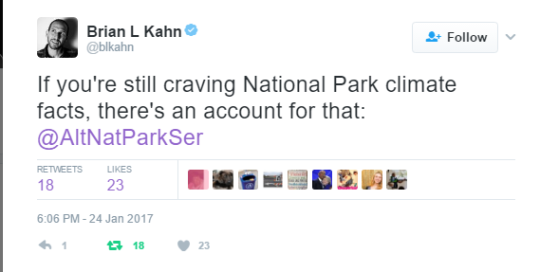
https://twitter.com/blkahn/status/824075818519396353

https://twitter.com/AltNatParkSer/status/824081620240056321
@AltNatParkSer confirms it is being run by active NPS rangers.
CHAOTIC GOOD RANGERS
cosmicgoat:
January 24, 2017
It’s not about Johnlock for me
It’s not about Johnlock.
Johnlock is only part of the problem. Many people in fandom, in tjlc part of fandom, are academics, writers, literary critics. We are taught to read texts. It’s our fucking job, what we have studied for.
The problem is, and I think it’s time to address it properly, that Moffits do not ever deliver. They always chicken out.
Finish the first season with a cliffhanger? Give your audience a lame resolution two years after.
The fall? Give zero explanation and mock your fans for theorizing. And yes, it was mocking.
Mary shot Sherlock? Gloss over this, bury it deep under the rug and pretend it did not happen.
Write a season, the fourth, which is filled with inconsistencies, with glaring continuity errors, and let it dangle as a possible clue to something more and then – forget all about it.
Get criticism? Answer with a poem rather than stop and think, “hang on, maybe he’s right, maybe we sort of don’t know where the fuck we are going”
Fill your show with romantic tropes, have your network queerbait the fuck out of fans and then get offended and be a dick to a fan who dares asking questions.
Yeah, the problem is not the lack of Johnlock. The problem is lack of intellectual honesty and humility.
I made a mistake, I overestimated them as writers. Lesson fucking learned.
wssh-watson:
isitandwonder:
sidhamish:
If you’ve ever been...
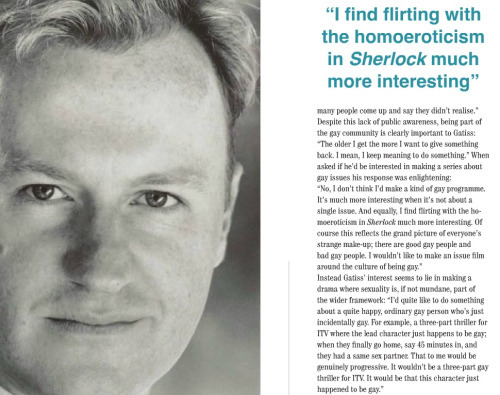
If you’ve ever been called crazy or delusional for noticing gay subtext in Sherlock please remember that Mark Gatiss actually said there was gay subtext in Sherlock. And that it was there intentionally.
Is that from buzz 2010 @sidhamish ?
So, he liked the flirting - but never actually wanted to go through with it and consumate? Why? Every narrative needs a purpose, a beginning and an end. In between, things happen, but they always lead up to something, at least in an artificial narrative. So, where should all the flirting lead to, Mr Gatiss?
If resolving the gay subtext was not the intention, I still don’t understand what the overarching narrative arc was. Great -> good? Didn’t sherlock show that journey in s3 already, applied to the only person through which it happened at all? (But then we also have his kindness towards molly, “I hope you’ll be very happy molly hooper)
To me that already happened in s3, in abundance. I still don’t see the necessity of introducing a secret mad sister who tortured and abused him just so he can forgive her in the end, serving a character development that already happened?
January 23, 2017
isitandwonder:
The only episode that remotely worked in S4 was TLD, because, eventually, there was...
The only episode that remotely worked in S4 was TLD, because, eventually, there was no (living) women beween Sherlock and John.
I remember that, after watching TST, I felt zero Johnlock vibes. The whole episode was just centred around Mary and getting rid of her. We were only told that John and Sherlock chased Mary together, but we never saw it. Instead, we got scenes with Mary alone, or between Mary and John, and Mary and Sherlock, or all three of them - but not one single scene just between John and Sherlock - there were always Greg or clients or whoever present. But it were those scenes just between Sherlock and John that, in previous episodes, were the most intense, intimate and touching moments.
I don’t really have to talk about zero Johnlock in TFP, have I? John saying vatican cameos and Sherlock biding his time; Sherlock trying to shoot himself and John looking on. Even the ‘John is family’ scene played out in the presence of Mycroft; it sounded more like John being a brother. And during the final scenes, we had Mary’s voiceover.
So, Mofftiss tried really hard to eliminate the Johnlock moments i S4 - and it killed their show. All characters seemed OOC, it got boring, there was no real character development, no motivation, TST and TFP seemed filled with meaningless rug pull scenes just for the sake of it, not even Mary dying has left a lasting impression or was particularly touching.
But then, in TLD, there once again was the feasible chemistry between Sherlock and John; they interacted, they touched, they talked. True, ghost!Mary was present during some of those scenes - but she couldn’t interfere, couldn’t interact with them - and the show thrived. The acting got better, the punch lines hit home, the timing worked. It once again was hilarious, funny, moving, sad, even clever. True, it might have been because even the format was more traditional Sherlock - with a case, a villain, a plan to take him down that again threatened to fail spectacularly - but it all worked beautifully. You could see that this was how the show should be - the two of them against the rest of the world, facing an external enemy (Culverton Smith) as well as their inner demons (John’s guilt and self-loathing, culminating painfully in the scene in which he beats up Sherlock, who lets him; Sherlock’s drug addiction because he had lost everything when John sent him away without even talking to him face to face at the end of TST).
And it all culminated in a scene in which they for once declared their special kind of love for one another without the need to define it (it is what it is). They were raw, honest, they interacted, they opened up. This is such a beautiful, intense, honest scene, superb acting, you can see a whole character study in just a small gesture - this is what made Sherlock the biggest show on earth. Not James Bond analogies or the killer sister from Saw crossbred with The Ring mocking ACD canon (3 Garridebs!).
Sherlock did not need all of this beefing up. It was and is at its best when you just let John and Sherlock be together.
But I fear, in their attempt to get rid of each and every Johnlock vibe, Mofftiss simply killed the show. They couldn’t or wouldn’t see that this relationship was the heart of their show - and in suppressing it, they burnt its heart out.
I still don’t understand why. But it shows to me that we didn’t halucinate these vibes, the subtext, the chemistry. It was there - perhaps only to be acknowledged even by the casual viewers when it was gone.
Something felt wrong, amiss, in TST and TFP. It felt like a whole different show. I think, in a way, it’s a case of ‘you don’t know what you’ve got until it’s gone’. Which, in reverse, proves the presence and importance of Johnlock for the quality the show once was so proud to deliver.
Hey! Just read your fix it for the end of TLD. It was great. It solidifies what I've been thinking about since TFP aired. Many have said that the fandom are just women who want to see two attractive guys kiss, have tried to spin it as "fetishist" but reall
There is so much I’m mourning! The loss of the love story, the way they made Sherlock suffer, seemingly endlessly, with no redemption or reprieve, the way they reversed or ignored the majority of their previous character development and narrative, the way they regressed all their female characters to misogynistic cliches, the way they queer-coded all the villains and made them sexually predatory, but wouldn’t even allow John and Sherlock a tender kiss. These writers have a lot to answer for, for sure!
Thank god for fan fic. And thank you for reading mine.
XistentialAngst's Blog
- XistentialAngst's profile
- 15 followers


